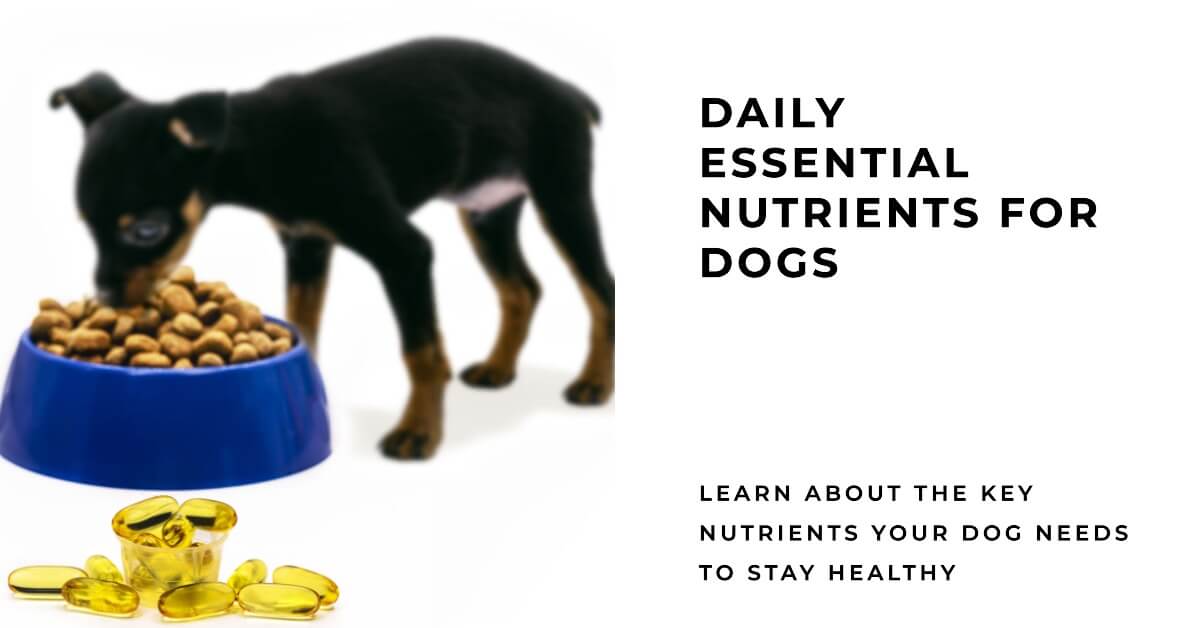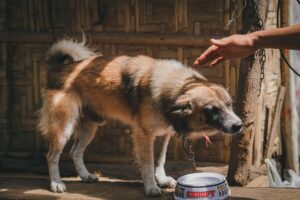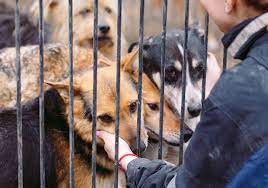When it comes to the well-being of our beloved furry companions, ensuring they receive a balanced and nutritious diet of daily essential nutrients for dogs is of utmost importance.
Dogs, much like humans, require specific essential nutrients on a daily basis to maintain their optimal health and vitality. In this article, we will explore the key nutrients that are vital for every dog’s well-being.
Table of Contents
ToggleProtein: The Building Block of a Healthy Dog
Protein serves as the foundation for a dog’s diet, playing a crucial role in building and repairing tissues, supporting a healthy immune system, and providing the necessary energy for an active lifestyle.
It is important to prioritize high-quality animal-based proteins such as chicken, beef, fish, and eggs in your dog’s diet. These protein sources offer a wide range of essential amino acids that are vital for your furry friend’s overall health.
Tip: To ensure your dog’s nutritional needs are met, look for dog foods that list a specific meat source as the main ingredient. A minimum protein content of 18% for adult dogs and 22% for puppies is recommended.
Carbohydrates: Energy for an Active Lifestyle
Carbohydrates are the primary source of energy for dogs, providing the fuel they need to maintain an active lifestyle.
Whole grains such as brown rice, oats, and quinoa are excellent carbohydrate sources that offer essential nutrients and dietary fiber. However, it’s worth noting that some dogs may have sensitivities to grains.
In such cases, grain-free options like sweet potatoes and peas can be incorporated into their diet to ensure they receive adequate energy from alternative carbohydrate sources.
Tip: Opt for complex carbohydrates that release energy gradually, keeping your dog energized throughout the day.
Healthy Fats: Essential for a Shiny Coat and Healthy Skin
Healthy fats play a crucial role in a dog’s diet, providing energy, supporting brain function, and promoting a shiny coat and healthy skin.
Sources of omega-3 and omega-6 fatty acids, such as fish oil, flaxseed, and chicken fat, are highly beneficial.
These fats not only offer essential nutrients but also possess anti-inflammatory properties that can contribute to joint health and overall well-being.
Tip: Consider incorporating foods like salmon or sardines into your dog’s diet to boost their intake of omega-3 fatty acids.
Vitamins: Supporting Overall Health
Vitamins are essential for dogs to maintain overall health and well-being. Some key vitamins include:
- Vitamin A: Promotes healthy vision, immune system function, and growth.
- Vitamin B Complex: Supports energy metabolism, brain function, and a healthy nervous system.
- Vitamin C: Provides antioxidant properties and supports immune system health.
- Vitamin D: Helps regulate calcium and phosphorus levels for strong bones and teeth.
- Vitamin E: Supports healthy skin, coat, and immune system.
While a well-balanced diet should provide these vitamins, your veterinarian may recommend supplements if your dog has specific nutritional needs.
Minerals: Essential for Vital Functions
Minerals are essential for various bodily functions, aiding in the maintenance of healthy bones, teeth, and overall well-being. Some important minerals for dogs include:
- Calcium: Important for strong bones and teeth.
- Phosphorus: Works in conjunction with calcium for bone health and energy metabolism.
- Iron: Required for the formation of red blood cells and oxygen transport.
- Zinc: Supports immune function, wound healing, and a healthy coat.
- Selenium: An antioxidant mineral that helps protect cells from damage.
It is crucial to ensure that your dog’s diet provides a balanced amount of these minerals. Commercial dog foods are formulated to contain appropriate levels of minerals to support your furry friend’s nutritional requirements.
Water: The Most Essential Nutrient
While often overlooked, water is, in fact, the most critical nutrient for dogs. It regulates body temperature, aids in digestion, and helps eliminate waste. Always ensure that your dog has access to clean and fresh water throughout the day.
Tip: Particularly on hot days or during periods of physical activity, make sure to offer water to your dog at regular intervals to prevent dehydration.
Conclusion
Proper nutrition is essential for your dog’s overall health and well-being. By understanding the daily essential nutrients your furry friend needs, you can ensure they receive a balanced diet.
Remember to consult with your veterinarian to determine the specific nutritional requirements for your dog based on their age, breed, size, and any existing health conditions.
A healthy diet, combined with regular exercise and lots of love, will help your dog lead a happy and fulfilling life.































